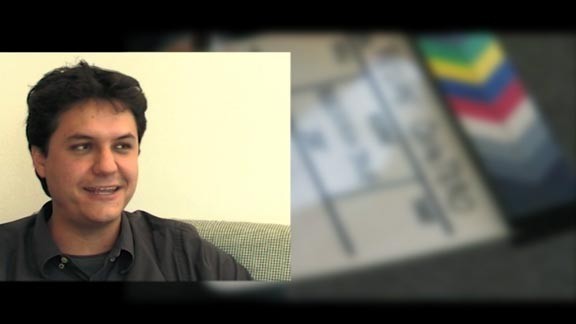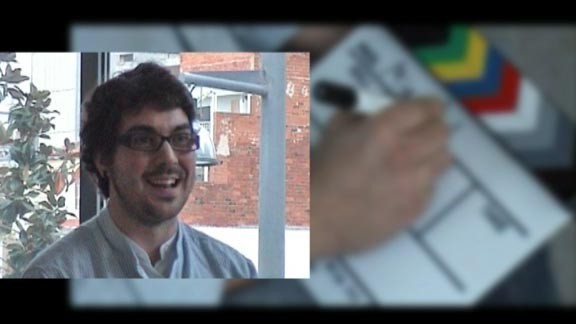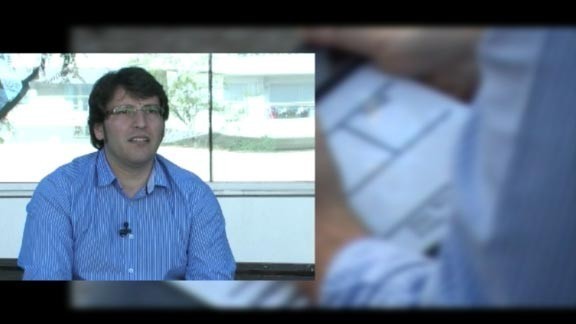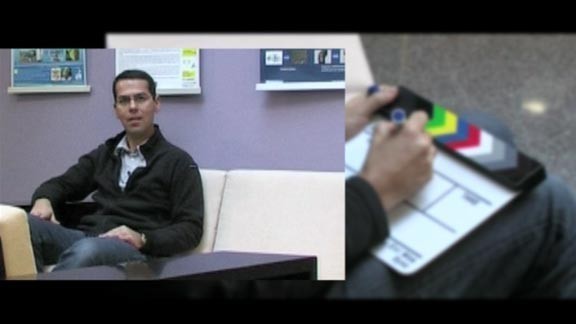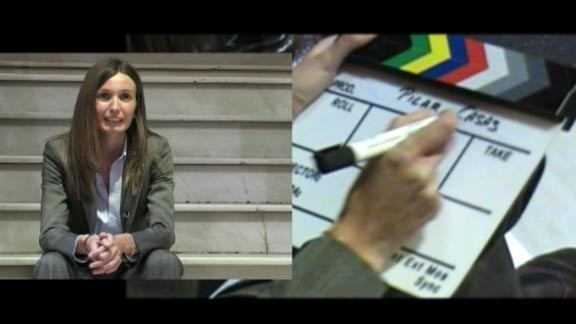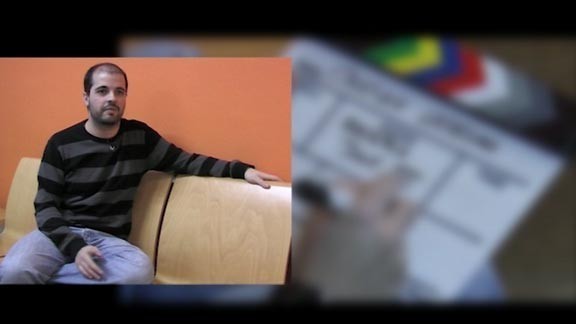Sèrie: UPC Recerca Jove anglès
6 de maig 2010
Algorithms to forecast natural disasters?
Accés obert
6 de maig 2010
Felipe Quintero swears that he loves bad weather. When it rains at night, he thinks, ‘We’ll have our work cut out for us tomorrow, analysing all the data and running the simulations!’
This young researcher is doing his PhD at the Centre for Applied Research in Hydrometeorology (CRAHI) within the framework of the IMPRINTS project, which is funded under the EU’s 7th Framework Programme and coordinated by UPC lecturer Daniel Sempere.
The IMPRINTS project seeks a better understanding of the phenomena that cause flash floods and debris-flow events, in order to improve risk management and develop forecasting and warning systems that increase public safety in situations involving flood risk. Nineteen public and private institutions from Spain, Switzerland, the United Kingdom, France, Italy, Holland, South Africa and Canada are participating in the project.
This young researcher is doing his PhD at the Centre for Applied Research in Hydrometeorology (CRAHI) within the framework of the IMPRINTS project, which is funded under the EU’s 7th Framework Programme and coordinated by UPC lecturer Daniel Sempere.
The IMPRINTS project seeks a better understanding of the phenomena that cause flash floods and debris-flow events, in order to improve risk management and develop forecasting and warning systems that increase public safety in situations involving flood risk. Nineteen public and private institutions from Spain, Switzerland, the United Kingdom, France, Italy, Holland, South Africa and Canada are participating in the project.
Electric airplanes?
Accés obert
6 de maig 2010
When deciding whether or not to do a PhD, Miguel Delgado drew up a list of pros and cons. He saw pursuing a PhD as a means of having more time to learn, but he was also aware of the lack of professional stability it entailed. Looking back, he realises that at the time he did not take into account one factor that he now considers crucial: ‘contact with industry’.
He first began to work on the EU’s MOET project as a result of a collaboration grant he received when he was still a student. The project, led by the company Airbus, seeks to improve the internal architecture of airplanes in order to make them lighter, safer, more fuel-efficient and less polluting.
Within the framework of the project, which is overseen by researchers Juan Antonio Ortega and José Luis Romeral, the UPC is responsible for diagnosing how the motor that moves an airplane’s ailerons works. The new version of this motor, which has traditionally been based on a hydraulic system, will use an electromechanical system instead.
He first began to work on the EU’s MOET project as a result of a collaboration grant he received when he was still a student. The project, led by the company Airbus, seeks to improve the internal architecture of airplanes in order to make them lighter, safer, more fuel-efficient and less polluting.
Within the framework of the project, which is overseen by researchers Juan Antonio Ortega and José Luis Romeral, the UPC is responsible for diagnosing how the motor that moves an airplane’s ailerons works. The new version of this motor, which has traditionally been based on a hydraulic system, will use an electromechanical system instead.
Semi-solid casting of metal parts?
Accés obert
6 de maig 2010
For Sergi Menargues, the best part of working as a researcher is that ‘research is a field in which you never hear the word “routine”!’
He is currently working on his doctoral thesis in the field of alloy casting by means of the sub-liquidus casting process and is a lecturer at the Vilanova i la Geltrú School of Engineering.
He is currently working on his doctoral thesis in the field of alloy casting by means of the sub-liquidus casting process and is a lecturer at the Vilanova i la Geltrú School of Engineering.
16 de maig 2010
Simulations to predict phenomena on a nanometric scale?
Accés obert
16 de maig 2010
This young researcher and civil engineer conducts his research in the fields of computational mechanics and numerical methods, the mechanics of carbon nanotubes and liquid membranes, and the use of finite-element technology to solve real engineering problems.
Marino Arroyo has received a prestigious Starting Grant for nearly €1.5 million to pursue his work in the field of multiscale modelling and computer simulation. Starting Grants are a highly competitive grant programme that aims to launch the careers of the most promising researchers. He has also been recognised by the ICREA Acadèmia programme, which rewards excellence in research and leadership with €250,000 grants intended to allow recipients to devote themselves primarily to research for a period of five years.
Marino Arroyo has received a prestigious Starting Grant for nearly €1.5 million to pursue his work in the field of multiscale modelling and computer simulation. Starting Grants are a highly competitive grant programme that aims to launch the careers of the most promising researchers. He has also been recognised by the ICREA Acadèmia programme, which rewards excellence in research and leadership with €250,000 grants intended to allow recipients to devote themselves primarily to research for a period of five years.
Recyclable tyres?
Accés obert
16 de maig 2010
This young industrial engineer specialised in chemistry and engineering management works in the private sector for a German multinational as a technical consultant on paint additives for the Spanish market. With a view to improving her CV, she decided to supplement her career with doctoral studies.
Pilar Casas is adamant that ‘without research, there is no innovation, and without innovation, companies aren’t competitive. We need new ideas, new products that position Catalonia at the forefront of scientific research.’ For Casas, research has an addictive side. ‘The best part about being a researcher is that the more progress you make, the more curious you become—you get hooked!’
Pilar Casas is adamant that ‘without research, there is no innovation, and without innovation, companies aren’t competitive. We need new ideas, new products that position Catalonia at the forefront of scientific research.’ For Casas, research has an addictive side. ‘The best part about being a researcher is that the more progress you make, the more curious you become—you get hooked!’
24 de gen. 2011
Hydrogen-producing plants?
Accés obert
24 de gen. 2011
For Cristian Ledesma, to be a researcher, ‘you need to be a naturally curious, very, very patient and persevering critical thinker’. It is not about mechanically performing experiments, but rather thinking about and understanding what you are doing at all times. You also need to be ‘passionate about research, organised and optimistic’. The most important lesson he has learned in recent years is that ‘patience is the mother of science’.
His doctoral thesis consists in studying a chemical reaction that uses a biomass-derived product called bioether to obtain hydrogen. Studying this reaction involves preparing and characterising catalysts containing different formulations of nanoparticles.
He is currently conducting experiments for his doctoral thesis, and he will shortly begin a research stay at the Norwegian University of Science and Technology (NTNU). He plans to defend his thesis next autumn. Once he has finished his PhD, he would like to continue to devote himself to research in the private sector.
His doctoral thesis consists in studying a chemical reaction that uses a biomass-derived product called bioether to obtain hydrogen. Studying this reaction involves preparing and characterising catalysts containing different formulations of nanoparticles.
He is currently conducting experiments for his doctoral thesis, and he will shortly begin a research stay at the Norwegian University of Science and Technology (NTNU). He plans to defend his thesis next autumn. Once he has finished his PhD, he would like to continue to devote himself to research in the private sector.
- ← Anterior
- 1
- 2 (current)
- Següent →


